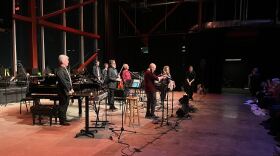The Milwaukee Symphony Orchestra needs an immediate $5 million to avoid a shutdown, according to reports from the Milwaukee Journal Sentinel.The organization's president and CEO Mark Niehaus says a date for the possible shutdown is a moving target, being pushed back as more donations come in.
But even if this current financial crisis is resolved, Niehaus says more changes will be needed to ensure the group's future. He is also calling for changes to the orchestra's performance schedule and a larger endowment.
The problems come even as many people say, and have written, that the orchestra has never sounded better. Audiences are responding, too. Even though fundraising has been successful, Niehaus says the orchestra is still left open to financial instability.
"We hit it out of the park," he says. "We are 74 percent contributed income, and...it's too good and it puts us at risk, because when we are reliant on annual fund every year to meet that large portion of our budget, if we have a hiccup, it hits us hard."
For example, the orchestra missed its budget goals last year and was short in funds at the start of the 2013-2014 season. A big part of the problem, Niehaus says, is the orchestra lacks a large enough endowment to sustain itself.
"It’s under-capitalization; the orchestra has an endowment that’s only 1 to 1 ratio with its annual budget. And we don’t control our home, our venue where we play," Niehaus says.
Currently, all the interest made off the orchestra's endowment investments go straight to funding a frozen pension liability left over from agreements made in the 1990s.
Another factor contributing the orchestra's financial issues is its performing season has been cut back over the years, allowing for fewer performances each year. When Niehaus joined the orchestra over 10 years ago, the concert season was 47 weeks. It is currently at 39 weeks. Niehaus says that's because the group is in constant competition for venue space with other performing arts groups who share the Marcus Center for the Performing Arts.
The orchestra also has received $1 million less today than it did 10 years ago from the United Performing Arts Fund, a group that raises funds to give to Milwaukee area arts groups.
Niehaus says the orchestra is already responding to these challenges. It's worked with the Marcus Center administration to push for more performance time. It will also lengthen its new season to 44 weeks, but each musician will work for 40 of those weeks, being laid off for four.
Niehaus says the orchestra must also increase its endowment, though past campaigns have not been as successful as it had hoped they would be.
But the current focus is raising those immediate funds to avoid a shutdown. Niehaus says shutting down is much more expensive than the amount of money they need to stay open.
If the orchestra shuts down, ripples will be felt beyond the MSO. It plays for the Florentine Opera, its members teach lessons around the area, and it fills a majority of the music faculty roster at University of Wisconsin-Milwaukee.
Niehaus says the financial problems aren't necessarily new; the MSO has had a financial crisis every three to five years for the last several decades. And they're a problem for similar institutions around the country as well.
Notably, the Minnesota Orchestra musicians have been locked out for more than 14 months, as the organization struggles to negotiate players' contracts and manage a significant deficit. Management announced a $1.1 million deficit this week, which is down from $6 million last fiscal year - the last full concert season musicians played, according to the Pioneer Press in the Twin Cities.
In Milwaukee, recent contract negotiations with musicians were "difficult," Niehaus says, but were done privately. The size of the orchestra is being reduced by at least 10 players. Niehaus was formerly the principal trumpet for the orchestra before being asked to step into his current position, so he brings a player’s perspective to his management role.
He says there's "complete alignment internally here" over addressing the organization's current financial crisis.
"Do we really want to live in a town that can't support its orchestra?" Niehaus says.
http://www.youtube.com/watch?v=YIbYCOiETx0&feature=c4-overview&list=UUWNFSCEvp8h5aEQ1GlI4Dtg
Read the Journal Sentinel's editorial on the MSO's financial situation here.






